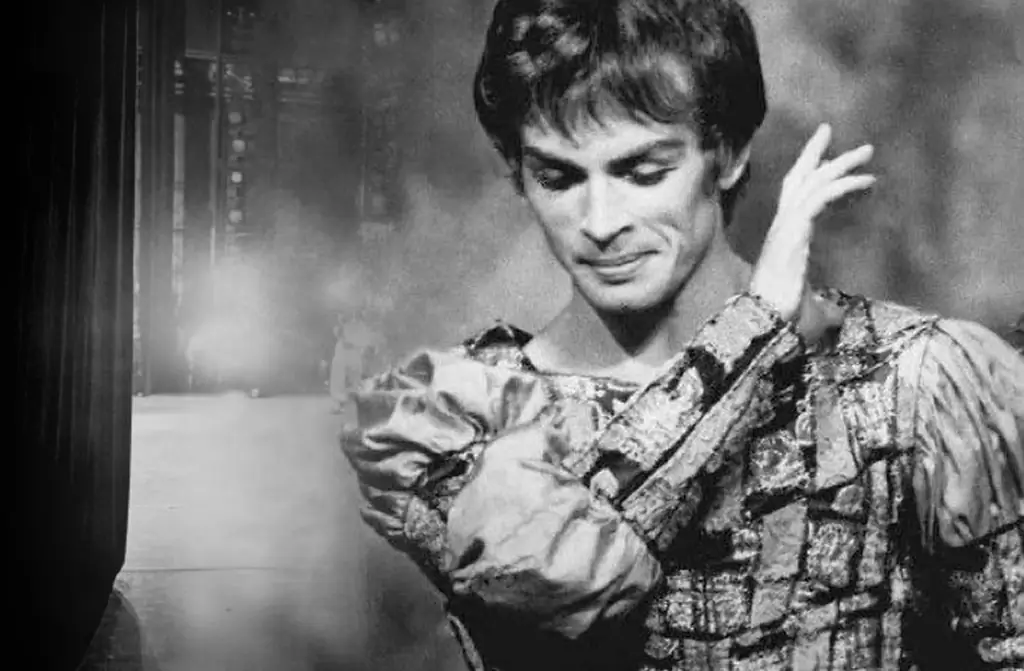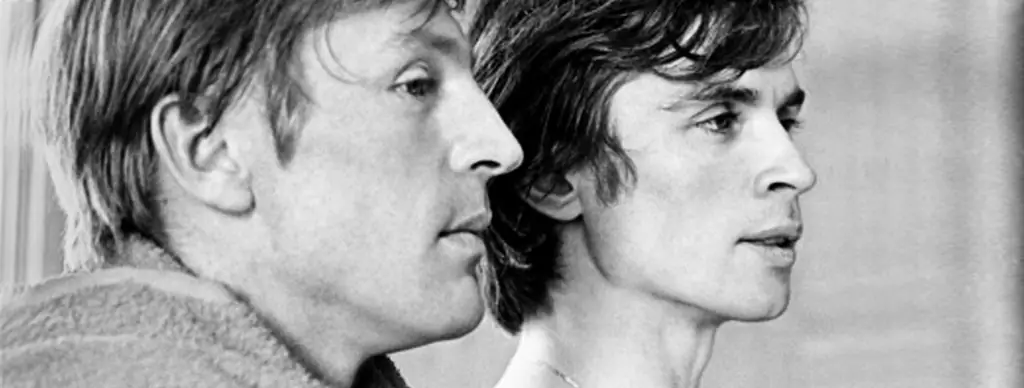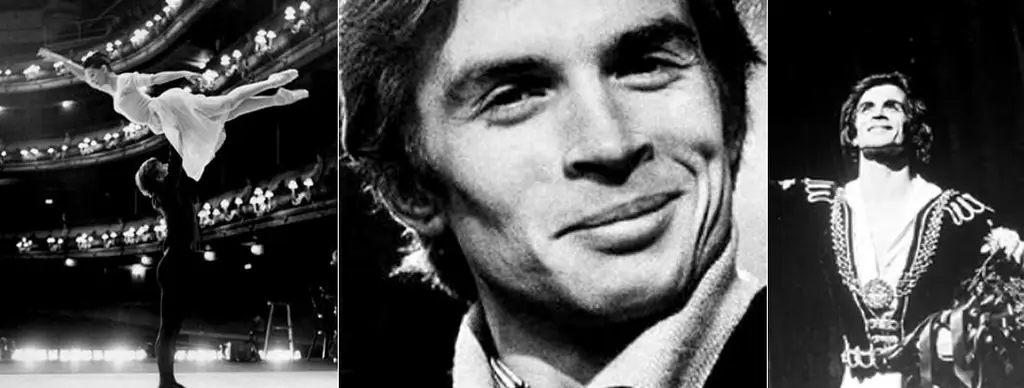- Author Adrian Jeff jeff@psychologosportal.com.
- Public 2023-12-17 05:06.
- Last modified 2025-01-24 14:09.

Genius, demon, fallen angel … Rudolf Nureyev. Part 2. Fallen Angel
Once, as a teenager, performing in a concert for remote rural areas, a young dancer found himself in a situation that, it would seem, could cross out his fate in art. He danced a sailor's dance, but someone else's suit was too big for him and literally on the second step his trousers, pinned up with pins, fell to the floor … Rudolph, amid the laughter of the audience, returned backstage to secure the sailor bell-bottoms. He enters the stage again, in order to find himself in negligee again in front of dozens of people in a few seconds …
Beginning in the article “Genius, demon, fallen angel … Rudolf Nureyev. Part 1. Conquest of Olympus"
Tartar is a good complex of bestial traits, and this is what I am
Rudolf Nureyev
Once upon a time Rudolph went through hard for the skin-lover ordeal of poverty, hunger, humiliating pressure of individuality. After the "escape", he abruptly replaced them with permissiveness, an abundance of the skin consumer society, money, allowing you to buy everything that fell on your eyes …
This became an even greater test for him. Genius and villainy, as it turned out, are compatible things, and greed, turning into monstrous stinginess, insulting disrespect for those who were not part of his group of interests, the lack of a moral core, which pushed him on adventures of a very dubious sense and a constant race to fulfill any of his own I want”- all this was part of the personality of the brilliant dance genius. Why? How can one explain the combination of such a high and unacceptably low in one person?
We all come from childhood … and geniuses too
The phenomenon of the existence of such sharp opposites in the personality of one person becomes more understandable if we consider it from the standpoint of Yuri Burlan's system-vector psychology.
Nature endowed Rudolph with a skin-visual ligament of vectors, which gives a person sensitivity, emotionality, the ability to love and the ability to see the world in polyphony of colors and shades.
Rudolph possessed all these qualities in potential. From his earliest years he was distinguished by the pursuit of beauty, love of music and dance, emotionality, impressionability, sensuality and passion. That is why ballet theater has become so attractive to him.
But “they don’t choose the times - they live and die …” Rudolph had a time and place when the realities of life prevented the normal development of a skin-visual boy, and the father, the owner of the anal vector and, consequently, other values, tried with all his might to level his son's personality, sculpt it "for yourself."
Khamet Nureyev tried to instill in Rudolph his own views and ideals of a “real man”. Vaccination failed. The violence has destroyed precious emotional bonds between father and son. Irrevocably and forever. Rudolph recalled with horror the time when his father turned off the radio and "talked for hours, talked, talked …", trying to instill in his son respect for his own priorities.
Hamet's heavy hand predetermined the line of life, her script and distorted Rudolph's natural interest in the opposite sex. For the development of the visual vector, it is necessary to create emotional ties with the child, educate his feelings, relying on the huge emotional potential inherent in nature. After all, he has an innate fear of death, which requires transformation, output in the form of emotions of compassion, sympathy, feelings of love. When this does not happen, the viewer remains in fear for life.
A broken boy with a skin-visual ligament of vectors, handsome, sensual, like a girl, with a fragile soul, in his later life will look for a sexual partner who creates the illusion of a protector and temporarily releases him from fears. As a rule, he becomes a man with an anal vector, in whom by nature is laid an attraction to adolescent boys, by sublimating which he fulfills his specific role - transfers them experience and knowledge. Rudolph's sexual partners were mostly very large males with an anal vector. This is the inevitable scenario of a beaten skin-visual boy left in fear for the rest of his life and looking for a protector.

Childhood trauma
Carriers of the skin vector are distinguished by high mental flexibility and the ability to adapt to the environment. The violence forced Rudolph to look for ways to survive. The lie became his salvation: “Since I was forbidden to dance at home, and naturally I could not quit dancing, I was forced to start a life full of lies. I constantly had to invent excuses to sneak out of the house for rehearsals and dance classes,”Rudolph admitted bitterly.
War childhood and adolescence, which coincided with the most difficult post-war period, could not be carefree for those who had to be born at that time. The poverty that forced Rudolph's mother to wear the sisters' rags on the boy was etched into his memory for the rest of his life as one of the most humiliating childhood memories. He fainted hungry and constantly expected ridicule from other children. What a humiliation this is for an ambitious skinner! His petty greed and passion for hoarding is rooted in childhood. A kind of need to compensate for the humiliation and poverty experienced.
Unbridled pursuit of a dream
Once, as a teenager, performing in a concert for remote rural areas, a young dancer found himself in a situation that, it would seem, could cross out his fate in art. He danced a sailor's dance, but someone else's suit was too big for him and literally on the second step his trousers, pinned up with pins, fell to the floor … Rudolph, amid the laughter of the audience, returned backstage to secure the sailor bell-bottoms. He enters the stage again, in order to find himself in negligee again in front of dozens of people in a few seconds …
Another in his place in those days would literally fall through the stage … But not Nureyev! He performed his number to a roar of applause! Because his goal was to win and nothing more. And he was ready to pay for it any price that was exorbitant for others.
Nureyev repeatedly repeated that he danced because he liked to do it. But ballet is hours-long, exhausting rehearsals, it is a regime and self-discipline, it is legs disfigured by extreme loads and hard labor … And he was able to withstand fatigue and pain in order to remain brilliant and unattainable on stage.
Furious eccentricity
A characteristic feature of people with a visual vector is their addiction to beauty in all its manifestations. Rudolph loved architecture, wandered around Leningrad for hours, fascinated by the fabulous city that captured history in stone. Museums were a place where his soul absorbed beauty and from where he brought his dream to try himself in painting.
Cutting back on his meager budget, Nureyev bought theater tickets and began taking piano lessons, which was his long-standing dream.
Tamara Zakrzhevskaya, with whom Rudolph was connected by something more than friendship, recalled: “There was one absolutely striking quality in Rudik: despite the lack of academic education, he had impeccable taste and was constantly striving to learn, see, read something new, fill in the gaps in your knowledge. I have never heard the word 'boring' from him."
Nureyev remained a dreamer and a little little boy until his last breath. After all, it is the people with the visual-cutaneous ligament of vectors that "do not age in body and soul." As a child, Rudolph could spend hours fascinatedly watching trains that took others to a happy life. He was bewitched by movement, speed …
Movement, changes, impetuosity are the essence of the manifestation of the skin vector. Subsequently, Nureyev never lingered in one place for a long time, changing cities and surroundings every few days.

One of the dancer's first acquisitions was a model of the railway, which he, already a ballet star, loved to play. The toy road opened the boundless space of imagination to the never fully matured Nureyev. Later, his collection included the most extraordinary road models, which also remained his favorite pastime.
Ardent and bright
Rudolph's passion for dramatic theatrical costumes and original everyday clothes is not only an echo of a childhood marked by poverty. This is one of the manifestations of the visual vector that needs attention. Including to reduce the level of fear. Clothing allows you to stand out from the crowd, declare yourself: "Look who came!" Rudolph, who created his own style, knew how to wear clothes effectively.
And also, according to his contemporaries, he "knew how to undress on stage like no other." Before him, dancers had never gone on stage with a naked torso before. He brought his nakedness to the ramp, making his body an instrument of art.
The stage for the spectator Rudolph was not a place of work, it was his podium and pedestal, where deep desires were realized - to be in the spotlight, thereby unconsciously overcoming fears. Skin-visual men, who remained in fear, are distinguished by a passion for publicity, demonstrativeness, and a tendency to exhibitionism. For the same reason, Rudolph did not like solitude. In rare moments, being alone, he spent hours talking on the phone or looking for adventure on the streets of night cities.
What would happen if …
The life of any person is not immune from falls, mistakes, disappointments …
Understanding his nature, realizing his desires and aspirations, a person is able to build a life line leading to joy, satisfaction and happiness. System-vector psychology of Yuri Burlan gives this knowledge, helps to correct childhood psychotraumas, to balance personal motives coming from the unconscious with the norms of society, to build constructive relationships with other people.
If you do not know this, it may turn out that the genius will remain in the memory of people and a fallen angel … too.
Register for free online lectures on systemic vector psychology by Yuri Burlan using the link and start looking at the world in a new way.






